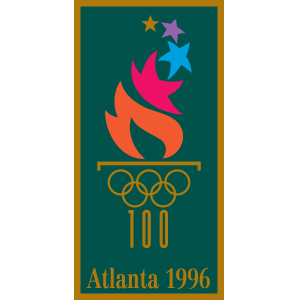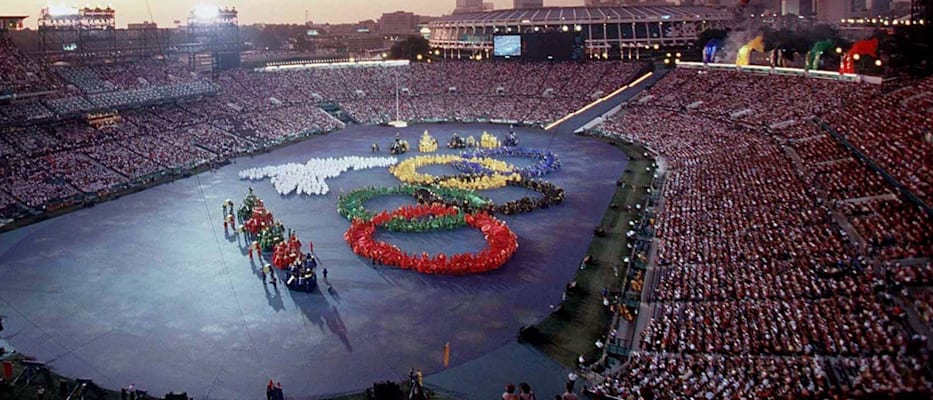The 1996 Games were given a dramatic and emotional start when the cauldron was lit by sporting legend Muhammad Ali. Next to the site of the main competition venues was an open area known as the Centennial Olympic Park. The park appeared to be part of the Games, but was not actually a part of the Olympic security system. In the early hours of 27 July, tragedy struck when a terrorist bomb exploded in the Centennial Olympic Park, resulting in the death of two people and the injury of 110 more.
For the first time in Olympic history, all 197 recognised National Olympic Committees were represented at the Games. Beach volleyball, mountain biking, lightweight rowing and women's football made their first appearance and sailor Hubert Raudaschl (AUT) became the first person ever to compete in nine Olympic Games. Before he began his streak in 1964, he was a reserve in 1960.
In track and field, Marie-José Pérec, the French athlete, won the 200m and successfully defended her 400m title. She became the most successful French female athlete of all time and the first athlete to win the 400m twice. Not to be outdone, Michael Johnson of the U.S. became the first man in Olympic history to run and win both the 200m and 400m. His victory over 200m in 19.32 seconds established a new world record.
Turkish Idol
Turkish weightlifter Naim Suleymanoglu became the first weightlifter in history to win three consecutive Olympic titles. "When he eats at a restaurant, nobody asks him to pay the bill; if he breaks the speed limit, he does not get fined, and the police wish him a pleasant journey," wrote a Turkish journalist.
NOCs: 197
Athletes: 10,318 (3,512 women, 6,806 men)
Events: 271
Volunteers: 47,466
Media: 15,108 media (5,695 written press, 9,413 broadcasters)
The Vote
During the 96th IOC Session in September 1990 in Tokyo, International Olympic Committee members voted in the final round for Atlanta (51 votes) over Athens (35 votes).
The Medals
Athletes from a record-breaking 79 countries won medals and 53 countries won gold medals.
Tennis
Tennis player Virag Csurgo (HUN) was entered in the doubles event only. On the morning of 24 July, she was helping a team-mate to warm up when she was informed that one of the singles entrants had failed to appear and Csurgo could take her place if she showed up for the first round match which was to begin in five minutes' time. Wearing her practice shorts and a t-shirt, Csurgo hurried over to the court and actually won the match.
Wrestling
In the second round of the middleweight (82kg) freestyle wrestling tournament, Elmadi Jabrailov of Kazakhstan faced Lucman Jabrailov of Moldova. The two were brothers from Chechnya, but chose not to represent Russia because of its war against their homeland. Elmadi won the high-scoring but unusually friendly encounter by 10 points to 8.
The Professionals are Admitted
Professionals were admitted to the cycling events.
For Women Only
A women-only sport was introduced: softball.
Professionals in Football
Each team that qualified for the football tournament was allowed to include three professionals, regardless of age or olympic experience.
Elimination of Demonstration Sports
Some demonstration sports were included in various editions of the Olympic Games up until 1992. The Organising Committees for the Olympic Games (OCOGs) could integrate demonstration sports into the Olympic programme. However, the organisation of these demonstrations created a lot of extra work for the OCOGs, which had to provide services that were almost identical to those for the sports on the Olympic programme. Therefore, at the 95th Session of the International Olympic Committee (IOC), held in 1989 in Puerto Rico, it was decided that demonstration sports would be eliminated definitively from the 1996 Atlanta Games onwards.
Ceremonies
Celebration in the Olympic Stadium for the Centenary Games.
Official Opening of the Games by:
President Bill Clinton
Lighting the Olympic Flame by:
Muhammad Ali (boxing)
Olympic Oath by:
Teresa Edwards (basketball)
Officials' Oath by:
Hobie Billingsly (diving)


